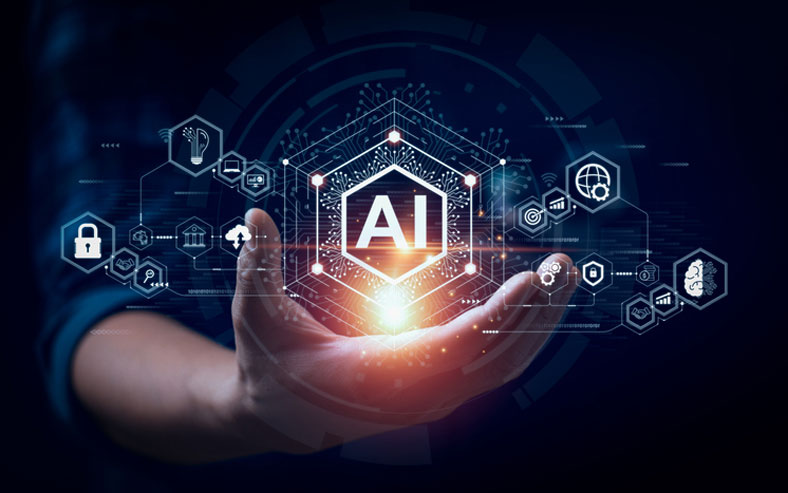Written by Scott Wilson
There’s an air of mystery surrounding what exactly goes on behind the scenes at companies leading in the development of artificial intelligence.
AI development is a field that has been swathed in secrecy. Companies treat their developments as trade secrets. Engineers are signed to strict non-disclosure agreements, and offices are heavy on both physical and cybersecurity measures. As exciting as their work is, staff aren’t encouraged to talk about it outside the confines of company Slack channels.
On top of that, some of the stuff they work on is so technically complex that even other folks in IT can’t understand it. And the concepts they deal with daily are ripped right out of the pages of science fiction… what is intelligence? How does the mind work? Is consciousness an emergent property of reasoning, or a necessary precondition?
The work of AI engineers is heavy stuff that pushes the limits of comprehension and technology all at once.
Featured Programs:Sponsored School(s) Arizona State University - OnlineFeatured Program: Artificial Intelligence in Business, BS
Arizona State University - OnlineFeatured Program: Artificial Intelligence in Business, BS Concordia University, St. PaulFeatured Program: Master of Science in Artificial Intelligence
Concordia University, St. PaulFeatured Program: Master of Science in Artificial Intelligence Campbellsville UniversityFeatured Program: MS in Data Science and Artificial Intelligence
Campbellsville UniversityFeatured Program: MS in Data Science and Artificial Intelligence Saint Mary's University of MinnesotaFeatured Program: Artificial Intelligence Certificate
Saint Mary's University of MinnesotaFeatured Program: Artificial Intelligence Certificate George Mason UniversityFeatured Program: MSAIT - Machine Learning Engineering Concentration
George Mason UniversityFeatured Program: MSAIT - Machine Learning Engineering Concentration
All of that comes together to make it tough for the average person trying to get into this hot field to imagine what their typical day on the job might look like. Do they sit around in hover chairs debating the nature of the universe or spend their whole day wearing VR goggles? Who can say?
Actually, we can. We’ve dug down into what a day in the life looks like in this cutting-edge industry. And we’re about to unveil some of the realities about working where the magic happens in the fast-paced world of AI engineering.
Why AI Engineers Aren’t Usually Called AI Engineers

It’s worth unpacking the title of Artificial Intelligence Engineer before we start looking at the jobs, though.
Engineering implies applied knowledge in service of practical projects.
Engineers aren’t sitting around in laboratories all day dreaming up theories and exploring the limits of the physical universe. They are digging in to solve real-world problems and develop tools and products that will be used by people and businesses every day.
But AI is a field that is still deep in the weeds of finding those basic laws and limits. Engineering, when it emerges, is still a kind of messy place that is still very much involved in breaking new ground in AI and related fields like:
- Machine learning
- Data science
- Robotic controls
- Sensors and feedback systems
For related reasons, then, an AI engineer isn’t always called an AI engineer. Many people pushing the bleeding edge in artificial intelligence today show up for work in the morning with titles like:
- Software Engineer
- Data Scientist
- Developer
- Business Intelligence Developer
- Decision Science Architect
- Robotics Systems Engineer
- System Design Engineer
- Machine Learning Engineer
- Staff Research Scientist
- AI Interference Engineer
AI Engineering Duties Are Influenced by Specialization and Organization

The state-of-the-art in AI is being developed in a dozen different ways at a few hundred universities, startups, and major tech players. They are all coming at it from different angles, often using teams that, until not long ago, were applying themselves to similar problems but in different ways.
The history of recent development efforts in different fields and organizations has an impact on the daily activities AI engineers perform.
This brings up at least one critical point when you are thinking about jobs in AI engineering: most of them are being created at well-established companies on teams that have long been working on tough technical problems.
The overall culture and work environment of those companies will have a serious influence over your day-to-day experiences working in AI. At a big corporation like Google, you’ll be a player on a team that is only one of hundreds. Your benefits, the expectations that are set, and the tools you are provided will be pretty similar to those of every other Googler.
 If you’re at a company with a strong remote work culture, you’re likely to work remote. If at one where showing up at the office is the norm, you’ll be in the office a lot. As management consultants like to say, corporate culture eats strategy for breakfast. It’s just as true when it comes to your daily experience on the job.
If you’re at a company with a strong remote work culture, you’re likely to work remote. If at one where showing up at the office is the norm, you’ll be in the office a lot. As management consultants like to say, corporate culture eats strategy for breakfast. It’s just as true when it comes to your daily experience on the job.
In many cases, these teams have been built and organized around paradigms other than what is thought of as AI development today. For example, self-driving car teams have been around for a decade or more. Much of the work around sensors, routing, and control systems is in artificial intelligence by nature. But team roles may be built around job title like:
- Motion Planning and Navigation
- Reinforcement Learning Engineer
- R&D Actuator Technician
- Modeling and Simulation Design Engineer
These can be hardcore AI engineering jobs, just as much as anything that says “AI Engineer” on the label. You have to look deep in the job descriptions to see how far they are sunk into AI development, though.
Teaching Robots to Read and Other Daily Tasks of the Modern Artificial Intelligence Engineer
While AI is exciting, it also fits pretty neatly into a mold that has been familiar in information technology for decades now. While the tech is unprecedented, the process is familiar: smart people get together, design program architecture, and write a lot of code.
Like everyone else in information technology, an AI engineer will spend the larger part of their day staring into one or more large monitors full of data and code.
 Some of that will be code that they have themselves developed to implement algorithms or techniques to power the mind of the machine. The data can be aspects of the performance and output of the code, or raw material for the input side.
Some of that will be code that they have themselves developed to implement algorithms or techniques to power the mind of the machine. The data can be aspects of the performance and output of the code, or raw material for the input side.
Other times, they will be reviewing and shaping the code that AI itself produces.
Equally important will be time spent modeling behavior. Engineers have to become experts in defining and testing intelligence. That’s a thorny problem even for philosophers to tackle.
But there is an element of AI engineering that keeps one foot in the world of theory. Developing AI is not strictly like other kinds of coding work. The goal is to teach rather than program. And the answers for how that is done aren’t in the textbooks yet.
Much of the work of behavior modeling can take the form of experimentation.
At the coal face, where the answers must be concrete, the most generally accepted way to determine the capabilities of AI is to create little tests. An AI engineer working on computer vision, for example, may create a generative adversarial network, or GAN, to generate fake imagery designed to look like real images. Feeding the GAN data into a machine learning system together with real imagery, the engineer will test how well the system discriminates between real and fake… critical stuff for a self-driving car, for instance.
Every Day on the Job, AI Engineers Push the Theoretical Toward the Practical
 Integrating software systems with devices that allow the AI expression is also a constant task. Some roles will involve more hardware architecture, like in self-driving vehicles or robotics. Others will focus on app development for user interface with the AI system. Ultimately, every engineer is working to make useful tools. They’ll always have an eye on what users will do with their creations.
Integrating software systems with devices that allow the AI expression is also a constant task. Some roles will involve more hardware architecture, like in self-driving vehicles or robotics. Others will focus on app development for user interface with the AI system. Ultimately, every engineer is working to make useful tools. They’ll always have an eye on what users will do with their creations.
So they will spend time researching use cases or working directly with focus groups. They also have to coordinate with project managers. In some cases, on large teams and in big companies, they may also dovetail their efforts with other business units or projects.
If an AI engineer isn’t spending a large portion of their day just thinking, then they are certainly engaged in activities designed to test or evaluate thinking.
As promising as AI is, it can still be very opaque. An AI engineer will spend many hours reviewing and interpreting output and telemetry data. Particularly with some of the most popular models today, generative transformers, the inner workings of AI algorithms are mysterious. Progress comes when sharp engineers pick apart apparently inexplicable results and find the common thread they need to pull to improve performance and behavior.
How Different Industries Shape the Daily Work Experiences of AI Engineers
 The daily activities of AI engineers are also influenced by the industry they are working in. AI is likely to have a big impact in almost every aspect of life and commerce. So there are projects taking off in almost every field imaginable, from healthcare to high finance.
The daily activities of AI engineers are also influenced by the industry they are working in. AI is likely to have a big impact in almost every aspect of life and commerce. So there are projects taking off in almost every field imaginable, from healthcare to high finance.
Just because they are building on the same blocks of basic research, though, these fields retain their own character and expectations. So a day in the life of an AI engineer will reflect some of the other features typical of those industries. Just a few of the industries where AI engineering is in high demand today offer some examples:
Healthcare Industry AI Engineers
Healthcare AI engineering work carries even more weight than AI development in general. With the potential to save lives, there’s a sense of urgency. But with the responsibility to avoid fatal mistakes, there’s also a lot of caution. These positions are conservative but exciting and involve more ethical and regulatory issues than many.
Finance Industry AI Engineers
AI in finance and banking is a key competitive advantage. Work in this area means beating other companies to the punch. It’s very secretive, but because of the sums involved, funding can be essentially unlimited. The appetite for risk is high, so if it’s remotely legal, you are likely to be allowed to work on new ideas for analysis and automated trading.
Defense Industry AI Engineers
 Just as sensitive and hush-hush as working for financial firms, AI development in the defense industry is also as heavy as in the healthcare industry. The specter of automated killing machines haunts every imagined AI apocalypse; yet the potential to protect troops in the field and the need to defend against AI from other countries makes this industry a destination for many forward-thinkers.
Just as sensitive and hush-hush as working for financial firms, AI development in the defense industry is also as heavy as in the healthcare industry. The specter of automated killing machines haunts every imagined AI apocalypse; yet the potential to protect troops in the field and the need to defend against AI from other countries makes this industry a destination for many forward-thinkers.
Manufacturing Industry AI Engineers
Robots have been a regular feature in manufacturing for a long time. Building on that work by adding more capabilities and reasoning puts AI engineers in this field on a firm foundation. If you enjoy honing well-defined processes and blending physical capabilities with machine intelligence, this is the place to be.
Transportation Industry AI Engineers
As one of the areas that has been most successful in putting real-world tools into the hands of consumers, AI development in transportation is one of the more mature fields for AI engineers. The problems have been well-defined and teams tend to be focused on visual processing, sensor integration, and reaction time optimization.
Entertainment Industry AI Engineers
Nowhere is generative AI more impactful than in the entertainment industry. A great place for creative AI engineers, working on creating tools for artists and actors is already changing the face of movies, music, and television. You’ll find a lot of deadlines and pressure in this industry, but also creativity and experimentation that wouldn’t fly in other fields.
AI Engineers Enjoy Plenty of Amenities at Work—With High Expectations for Performance
By and large, cutting edge AI engineering isn’t happening in places that are running on a shoestring. You can expect the work environment to be outfitted with all the standard amenities of the American technology industry the 21st Century:
- Gathering spaces for discussion and relaxation
- On-site food and snacks
- Laundry services and delivery
- Massage and rest areas
The reason for those superb benefits, however, is to slap you in the proverbial golden handcuffs: many AI engineers spend long hours on the job. If you’re excited enough about the field, you will be among the many who show up early and leave late.
AI Startups Are Flourishing, Opening Up a Lot of New Jobs in AI Engineering
 Although there are plenty of big companies getting into AI, the excitement and innovation are also sparking plenty of startup plays in the field.
Although there are plenty of big companies getting into AI, the excitement and innovation are also sparking plenty of startup plays in the field.
A day on the job at a startup is like nothing else. You won’t usually get the amenities, or the paychecks that a Tesla or Apple might shower on you. But you will get a shot of adrenaline every day that you show up to change the world.
Days are long at startups. The odds of success aren’t always great. But the camaraderie is unmatched and the potential is vast. Your control and influence are always going to be bigger in smaller companies. If you’re someone who has big ideas for AI and the energy to follow through on them, then a startup may be in your future.
There’s a flood of venture capital heading toward AI startups, so their ranks are growing rapidly. New AI startups are created all the time. So if you don’t find the kind of position you are looking for elsewhere, keep looking… or launch your own!
Not unlike the dot-com bubble, though, it’s likely that the AI bubble will pop, or at least consolidate at some point. But keep in mind: after the froth got skimmed off the top of the internet boom of the late 1990s, it still left the core industry that shaped the world today. Similarly, there’s no turning back on the importance of AI. Experience in the pressure cooker of a startup always has value—if you can handle it.
The AI Engineering Environment Fosters High-Caliber Intellectual Interaction
 If some of the stuff that AI engineers are doing from day to day is black magic, that’s just because you haven’t yet received the education they have.
If some of the stuff that AI engineers are doing from day to day is black magic, that’s just because you haven’t yet received the education they have.
For such complex and original work, most companies are looking for engineers who hold a graduate degree at a minimum. In the academic world or at the best-funded operations, the minimum could very well be a PhD.
So one feature of AI engineering no matter where you find it is the opportunity to work with a lot of really smart, well-educated people. And you will find the expectations for your own base of knowledge to be just as high. It’s the kind of job where you can expect to be pushed to achieve the best. And you’ll be pushing right back, taking your team to new heights.
One of the beautiful things about working in AI engineering today is that you are part of the generation that will define what a day in the life of an AI engineer will look like tomorrow. New breakthroughs are happening all the time. New applications and new capabilities are found almost daily. So with the right education and motivation, you can shape your own experience working on the cutting edge of AI.











